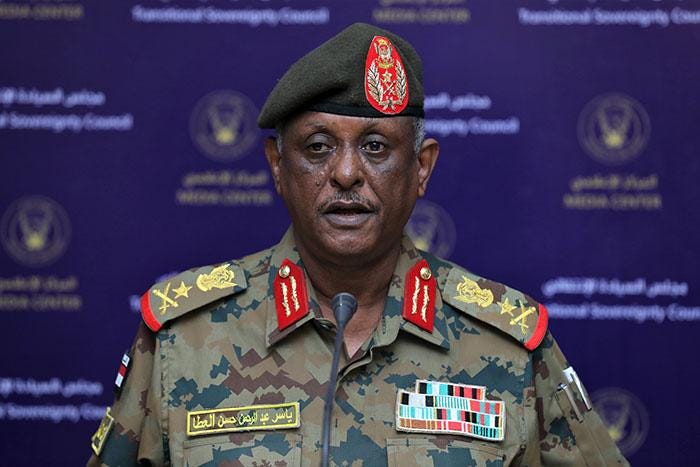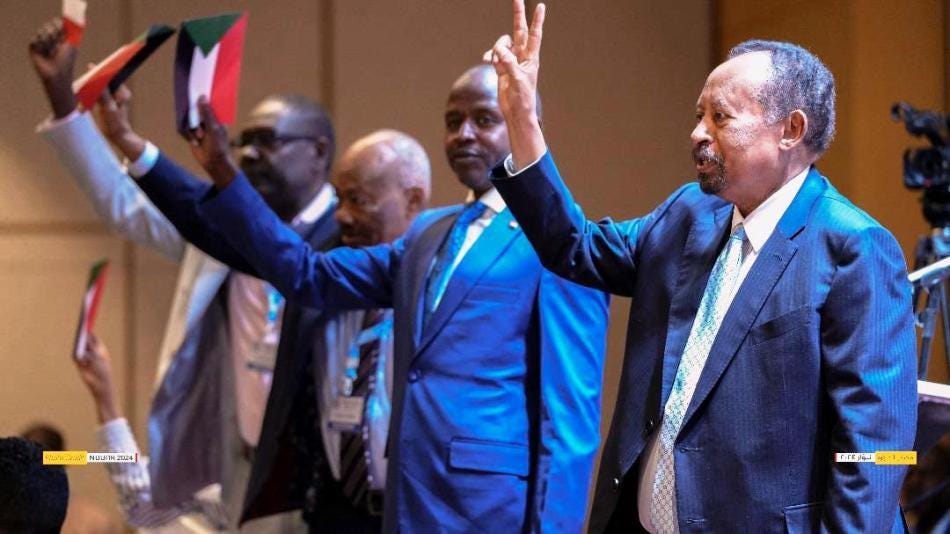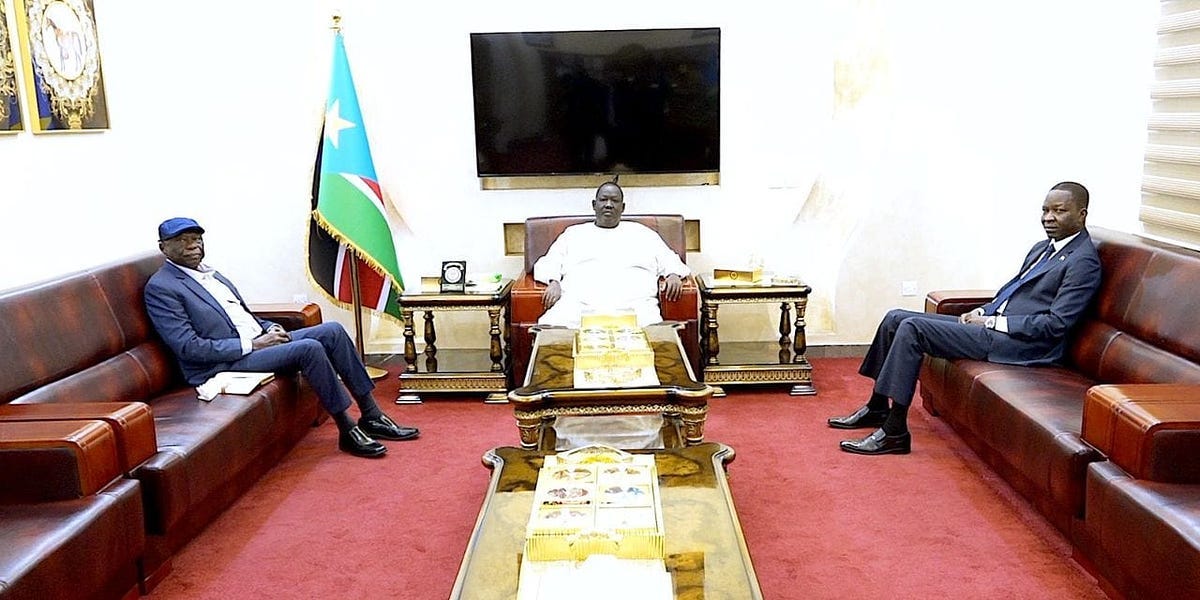SAF demands RSF withdrawal before talks
Plus: Civilian bloc gathers in Ethiopia to build momentum for peace
A top member of Sudan’s military junta said in a recent television interview, “we want peace,” calling on the Rapid Support Forces (RSF) to withdraw toward their pre-war cantonment sites as a step toward ending the war.
Sudan’s military leaders have consistently demanded such a withdrawal as a precondition for a ceasefire. More typically, ceasefires involve freezing forces in place, rather than the unilateral withdrawal by one side or the other.
The demand poses an obstacle to resumption of the Jeddah negotiations mediated by Saudi Arabia and the United States last year, which are on hold.
Speaking with Al-Hadath news channel, Yasser Abdelrahman Al-Atta, Assistant Commander in Chief of the Sudan Armed Forces (SAF) and a member of the military-led Transitional Sovereign Council, referred to the RSF a “terrorist militia,” saying the paramilitary must be dismantled and some members must be put on trial.
He also implied that a substantial number of RSF fighters are foreigners—a common trope of SAF propaganda, which plays on ethnic stereotypes and prejudices. (Although there are foreign elements of the RSF, especially Chadians and a smaller number of South Sudanese, the vast majority of RSF fighters are Sudanese-born).
Al-Atta said,
“We, who want peace, say that foreign fighters within these militias should return to their own countries. Sudanese forces should go to their main camps: Bahri, Karari camp in Omdurman, Taiba camp in Khartoum, and Salha camp in Omdurman. This is for the sake of peace.”
He emphasized accountability for wartime crimes and the redeployment of Sudanese RSF forces to designated camps in four locations in the capital Khartoum. Al-Atta outlined a multifaceted process involving disarmament, negotiation, and the integration of non-criminal forces into the armed forces after the removal of foreign elements:
“Can the Sudanese people and the entire world ignore all these crimes without accountability? Is this a logical question or not? I am not asking you but leaving the answer for the ordinary viewers. The process involves handing over large weapons, completing the second stage of negotiations, and integrating the remaining forces into the army after the foreign fighters are evacuated. Following the trial of those who committed crimes, there is a public right and a private right. Regarding private rights, if a Sudanese citizen opens a case, I have no authority to tell them to drop it. This can only happen after a court decision. The remaining forces, those who haven't committed crimes against the Sudanese people, can be integrated into the armed forces. There are questions: Are all these forces organized under one command? Is peace possible with two armies? Is there any respectable country in the world that achieves peace with two armies?”
Prior to the conflict, the RSF maintained a significant presence in Khartoum with camps located in Karari and Salha (Omdurman), Taiba (Khartoum), Al Jili, Special Forces camps 1 & 2, and Muzalat (Paratroopers) camp (Bahri). Most of these camps were attacked by SAF aviation during the first hours of the war and the RSF, though it control areas where most of these camps are located, is now mostly deployed within civilian neighborhoods.
The RSF has not yet responded to Atta's proposal. But they have demanded, previously, the dissolution of the SAF, expulsion of elements from the former regime, and a unified national army incorporating both forces, with Abdelfattah Al-Burhan, the head of the SAF, removed from power and facing prosecution for alleged “crimes against the Sudanese people.”
Taqaddum pushes for peace
Meanwhile the Coordination of Civil Democratic Forces on Monday convened its inaugural conference in Addis Ababa, Ethiopia. Commonly referred to as Taqaddum, this alliance emerged in the early stages of the conflict and is headed by former Prime Minister Abdalla Hamdok, who is also the head of the Forces of Freedom and Change (FFC).
Hamdok, speaking during the opening session of the conference, emphasized the group's focus on alleviating the suffering of civilians caught in the crossfire and restoring a democratic path for Sudan. He called for an immediate ceasefire and urged the international community to pressure both sides to return to negotiations for a comprehensive solution that restores peace, justice, and democracy.
“We stand with the families of the martyrs, both civilian and military, and with those who were unwillingly drawn into this war. Our efforts are not because we are a party to the war, nor do we stand neutral. We are biased towards the hungry, the poor, refugees, and the displaced. The democratic program is for a homeland that accommodates everyone. Taqaddum is a step in the right direction, but it does not represent all of Sudan.”
Stalled talks with SPLM-North
Efforts to mediate a separate ceasefire between the SAF and the rebel Sudan People's Liberation Movement-North (SPLM-North) remain stalled. Talks in Juba, South Sudan, collapsed last week after the SPLM-North demanded unrestricted humanitarian access, including to areas controlled by the RSF.
The SAF, for its part, demanded the creation of an air bridge to deliver aid to besieged areas. The SPLM-North views the air bridge proposal as a ploy by the SAF to resupply troops in Kadugli, South Kordofan, and Babanusa, Western Kordofan.
South Sudan's foreign minister, Ramadan Goch, downplayed the collapse in comments to Sudan Tribune, claiming the parties requested consultations with their leaders. However, the disagreement over access to RSF-controlled areas remains a major sticking point, hindering the resumption of talks and progress towards a broader peace deal.
“That is not a breakdown. They were adjourned at the request of the parties to consult with their respective leadership. You should appreciate the parties’ gesture. They have shown leadership by voluntarily proposing and attending meetings and holding discussions. This demonstrates their commitment to peaceful dialogue and political resolution,” Goch said.
Goch praised both the SAF and SPLM-North for attending meetings, discussing issues, and proposing the adjournment. He also mentioned President Salva Kiir's communication with both parties, encouraging them to continue negotiations. Goch concluded by stressing the importance of communication and coming together to find solutions, rather than avoiding talks.
“The President, General Salva Kiir, has communicated with the leadership on both sides, commending their leadership and urging them to continue with the same spirit and return to the negotiating table. When brothers have issues to discuss, the solution is not to avoid each other but to come together and talk. They have demonstrated this and should maintain it,” Goch said.
Kenyan efforts to mediate
On May 18, former Prime Minister Abdalla Hamdok signed the Nairobi Declaration with rebel leaders Abdelaziz al-Hilu of the SPLM-North and Abdel Wahid Mohamed Nur of the Sudan Liberation Movement (SLM). This initiative was organized by Kenyan President William Ruto.
Kenya's relationship with Sudan's ruling military has deteriorated since last year's initiative. Kenya, leading a group of four states, proposed the deployment of a regional force to protect civilians and deliver humanitarian aid to those trapped in the war zone. This proposal angered Sudan, which accused Kenya of supporting and hosting leaders of the RSF.
The Nairobi declaration outlines a vision for peace in Sudan, including an end to the war and the establishment of a secular federal state. It also recognizes the right to self-determination for the people of Sudan if the terms of the declaration are not agreed upon at a planned roundtable discussion.
Hamdok also called on warring parties to open safe corridors for delivering humanitarian aid and address the looming famine threatening millions.
Ruto commended the Nairobi Declaration and emphasized Kenya's continued role in achieving lasting peace in Sudan and highlighted the importance of including civil society and political parties in the peace process and the formation of a civilian government.
“I congratulate organized groups and civil society which have agreed, through the Nairobi Declaration, to be part of Sudan's Peace Process. A holistic and comprehensive process is the way to achieve peace.”
Sudan's government sharply criticized the SPLM-North for signing agreements with Hamdok, who they accused being a political mouthpiece for the RSF, while demanding the RSF's inclusion in the Juba talks focused on a humanitarian ceasefire between with the SAF.





